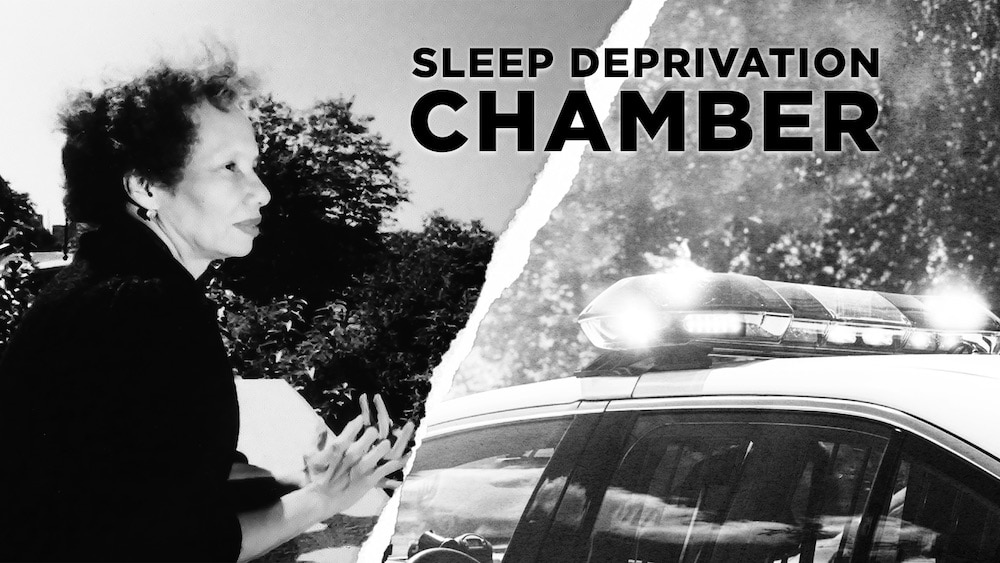Twenty-nine years before George Floyd was murdered on camera and 18 years before Black Harvard professor Henry Louis Gates was arrested for “breaking and entering” into his own home, Antioch College student Adam Kennedy endured his own confrontation with the police. One evening in 1991, he was followed by an Arlington, Virginia, officer who noticed Kennedy’s broken taillight. The two men confronted each other in the driveway of Kennedy’s father’s home.
“What’s the charge,” Adam asks. Accused of assault and resisting arrest, Adam ends up beaten and dragged across the pavement.

Kennedy’s experience might have been just another in a long line of racist incidents involving young Black men pulled aside by policemen seething with bias. But Adam Kennedy happens to be the son of playwright Adrienne Kennedy. Together, mother and son tell the tale of Adam’s arrest and its aftermath in their 1996 play, Sleep Deprivation Chamber. The play has been digitally staged by Round House Theatre in partnership with the McCarter Theatre Center and is ably directed by Raymond O. Caldwell. It is the second of four digital productions celebrating Adrienne Kennedy’s influential works.
Teddy Alexander, the lightly fictionalized Adam, is terrified by the encounter. As Teddy is bludgeoned again with questions voiced by unseen detectives and prosecutors, his confidence in his story wobbles. His recall of minute details fades in and out under interrogation. Similarly, when his father, who is awakened by the fracas, is questioned by authorities, he too must try to resist a system weighted against Black males. Long before we had today’s label to pin on it, privileged white power brokers were spinning “alternative facts.”
Suzanne Alexander, Adrienne Kennedy’s alter-ego, furiously pens letters to Governor Douglas Wilder and other public officials protesting Teddy’s treatment. She proclaims her son’s sterling character, the accomplishments of his parents, and the work of grandparents who fought for civil rights.

As in other of Adrienne Kennedy’s works, this story branches out to a broader meditation on race, family, and violence. Hypnotic dream sequences, nightmares involving her children, a recollection of Emmet Till, the repetition of memories, and references to Hamlet, which Teddy is rehearsing at Antioch, are woven into the play. We are reminded that the abuse of power echoes through human history and that time, as Hamlet notes, is truly out of joint.
Suzanne recalls attending camp meetings in Aurora, Ohio — a place name that rolls lovingly off her tongue like sweet butter. Redolent of a less complicated and more hopeful time, it was there where distinguished Blacks gathered to discuss “How to Make Life Better for Negroes.” The memories are beautiful and sad. Despite her letter-writing campaign on behalf of her son, these gauzy recollections reveal just how hard it is for Suzanne to fully face the ongoing victimization of Black men.
This heady mix of soliloquies, dreams, and recollections creates an intoxicating rhythm throughout the first part of the play. Yet things take an unexpected sharp turn in the latter part where Teddy is put on trial. Now we are cast into a real-time narrative. Teddy’s lawyer and the prosecutor are not disembodied voices. They appear onstage to question Teddy, his father, and Officer Holzer. The change in dramatic structure is a wake-up call. Neither we nor the Alexander family can escape from this living nightmare.

Powerful lead actors bring the Kennedys’ story to life. Kim James Bey is majestic as Suzanne, whose pride and grit, sentimentality and protectiveness, are doled out in equal measures. Deimoni Brewington inhabits the terrorized Teddy, playing Suzanne’s son not only as a slightly awkward teenager, but also channeling the fears of generations of Black men who have somehow run afoul of the white establishment. The venerable Craig Wallace as Teddy’s father, David, brings both extraordinary tension and gravitas to his role. Rex Daugherty as Officer Holzer shows cocky assuredness that ultimately gives way to a grudging admission that Teddy had scarcely touched him.
Teddy beat his trumped-up charges. Many other Black men have not. The fact that the Kennedys’ play resonates so deeply today is the result not only of its transcendent power and enduring artistry, but also our failure to root out the causes and consequences of racism that still bedevil American life.
Running Time: 90 minutes.
The Work of Adrienne Kennedy: Inspiration and Influence features four plays, released between November 14 and December 12, 2020. Each play will be released on a specific date and will be available to view on demand until April 30, 2021. Tickets can be purchased by calling 240-644-1100 or ordering online at RoundHouseTheatre.org

SEE
Round House begins monthlong tribute to living legend Adrienne Kennedy
Adrienne Kennedy festival opens with haunting letters between lovers review by Amy Kotkin
Adrienne Kennedy festival replays a painful drama from her own life




